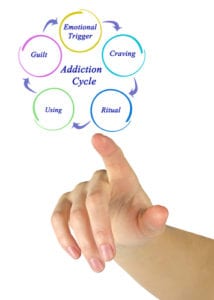Many of us have friends, family, or extended family who have gone through addiction. According to the National Survey on Drug Use and Health, 23.5 million Americans aged 12 or older needed treatment for an illicit drug or alcohol abuse problem. When family members have an addiction, their attitude and behavior changes. This, in turn, changes the equilibrium within the household – whether it is spoken or unspoken. Psychology Today notes that patterns of interactions between family members may include how feelings are expressed (or not), how conflict is managed (or avoided), how family issues are communicated in the world outside of the family system, what roles each family member is assigned to, and more.
These patterns impact every member of the family, leading some to adopt negative patterns of behavior, continuing the negative cycle of addiction. Luckily, this doesn’t have to be true. The National Association for Children of Addiction states that recovery and even abstinence is possible – you can break the cycle. Tim Sanford of boundless.org, author and licensed professional counselor with over 20 years of experience as a clinician, has provided several key steps to breaking the family cycle of addiction, or even dysfunction.
- Become aware. This is the first step towards change for yourself. Become aware of what is happening and how everyone is affected by others’ actions. Ask a trusted individual for an outsider’s perspective if you need to gain better understanding.
- Take ownership. Take responsibility for the dysfunction that you enact. Accept your own actions, attitudes, beliefs, and emotions. Make “I” statements, such as “I need help” or “I need an attitude adjustment.”
- Purposefully observe. Observe how your friend’s families act with one another. Do they listen to one another? Do they react in a calm manner? Compare this to your family circumstance. Observe the differences and determine what is healthy or unhealthy.
- Research. Explore codependency, addiction, adult attachment and pain, manipulation, family roles, and more. As you research, ask questions about your family history. Question what you have been taught with what you read to determine if what you have learned is healthy and appropriate.
- Practice. Practice acting and thinking in the ways that you have learned are healthy. Speak kinder to yourself. Truly listen to others. Practice engaging in healthy activities. Make friends with people who focus on being healthy and good citizens.
- Be patient. Understand that learning a new pattern of thinking and behavior will take time. Recognize that you can only change yourself, not others.
If you have an addiction, recovery is still possible. Take your first step towards recovery and call us today at 855-464-7849. Avalon Malibu is a world-renowned mental health and addiction recovery treatment center that truly cares about your success and recovery. We believe in mind, body, and spirit, meaning that you will feel restored. You deserve to have control back over your life. Call us now.












